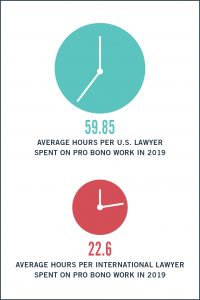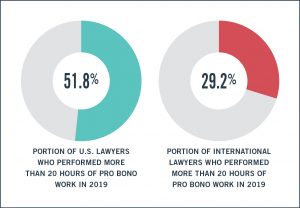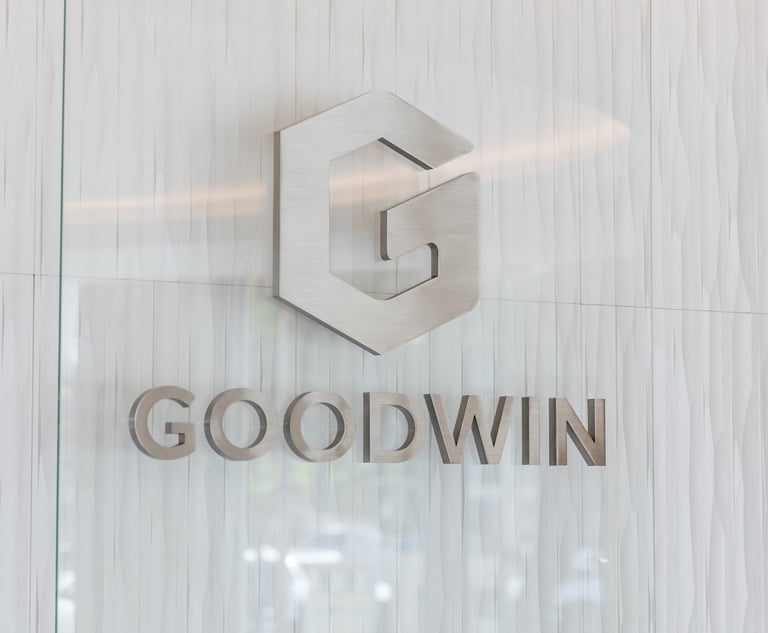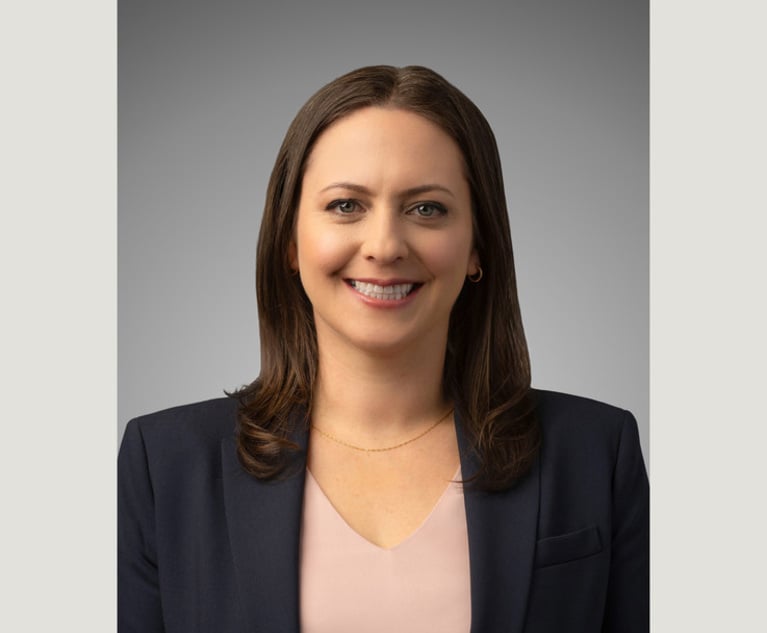Facing Down a Crisis, Big Law's Pro Bono Departments Prepare to Do Their Part
The Pro Bono Scorecard shows Big Law contributed more than 5 million hours of pro bono last year. Now, as the pandemic pushes millions of Americans to the brink, pro bono leaders are ready for a surge of clients in need.
July 06, 2020 at 05:00 AM
10 minute read
 Credit: Adobe Stock
Credit: Adobe Stock
Law firms had no shortage of options for channeling their pro bono resources in 2019. From immigration and asylum issues to tenants' rights, criminal justice and human rights, the Am Law 200 put more effort than ever into their myriad missions, resulting in 5.4 million hours of pro bono work, as well as higher individual averages and more widespread engagement, according to The American Lawyer's annual Pro Bono Scorecard.
Now, as the coronavirus crisis brings additional need to the forefront in 2020, law firms anticipate a surge of pro bono cases related to housing and employment issues, even as the challenges of remote work have complicated lawyers' efforts to deliver for their clients.
"We're all adjusting to remote work, and one of the difficulties—unlike other disasters—is that everyone's affected," Steven Schulman, co-president of the American Bar Association's Association of Pro Bono Counsel and leader of Akin Gump Strauss Hauer & Feld's pro bono practice, says.
Despite the unique circumstances presented by the current crisis, lawyers are rising up to meet the challenge.
"Whatever needs existed before the pandemic still exist. If you had a housing issue before COVID-19, you definitely still have one now," says Brenna DeVaney, global pro bono director at Skadden, Arps, Slate, Meagher & Flom.
In the months since the pandemic began, she says, the pro bono community has come together to coordinate and problem solve in order to be best-prepared to meet clients' immediate needs, such as life planning for medical professionals, supporting small businesses applying for Paycheck Protection Program loans, and securing medical release for vulnerable prisoners.
"Pro bono work is the connective tissue across law firms, and I see real collaboration among lawyers who know there is unmet need and have the privilege and resources to meet that need," DeVaney says. "This holds true right now, where the minute we understood we were going to have an unprecedented crisis to deal with, everyone started to convene."
Next year's Pro Bono Scorecard will tell the tale of the industry's response in 2020, but firms were already stepping up their efforts in 2019, according to this year's scorecard. Among the 138 firms that completed this year's survey, 52.4% of lawyers contributed at least 20 hours of pro bono work, and the industry average was nearly 60 hours, notable improvements on the prior year's marks of 48.4% and 57.5 hours.
Leading the Charge
Jenner & Block once again topped the Pro Bono Scorecard, averaging 175.4 pro bono hours, while 105.8% of the firm's lawyers completed more than 20 pro bono hours.The scorecard ranks the Am Law 200 by the average number of pro bono hours performed by their U.S.-based lawyers in 2019, and calculations are based on firm head counts as of Dec. 31, 2019, meaning the work of lawyers who left before year's end could put a firm over 100% in the 20-hour measure.
 Credit: Roberto Jimenez
Credit: Roberto JimenezThe American Lawyer defines pro bono work as legal services donated to organizations or individuals that could not otherwise afford them and does not include work done by paralegals or summer associates, nor time spent on bar association work, nor on nonlegal work for charities or on boards of nonprofit organizations.
Arnold & Porter Kaye Scholer and Paul, Weiss, Rifkind, Wharton & Garrison joined the top 10 on the scorecard, climbing eight and 16 spots respectively to place ninth and 10th. They rounded out a group that included Covington & Burling; Hughes Hubbard & Reed; Wilmer Cutler Pickering Hale and Dorr; Orrick, Herrington & Sutcliffe; Skadden; Paul Hastings; and Ropes & Gray, all of which were also among the top 10 last year.
The top 10 firms on the 2020 Pro Bono Scorecard together averaged 133 hours of pro bono work per lawyer, and 85% of their lawyers completed at least 20 hours of pro bono work in 2019.
Alan Pemberton, who directs Covington's pro bono program as co-chair of the firm's public service committee, says the firm was busy in 2019 with pro bono work in areas including criminal justice, civil rights, veteran support, LGBTQ issues, environmental matters and women's rights. The firm ranked second on the 2020 Pro Bono Scorecard, with an average of 190.7 donated hours and 82.6% of its lawyers contributing at least 20 hours.
Pemberton highlights the firm's victory in the District of Maryland challenging a citizenship question on the 2020 census, its successful representation of a Kansas woman running a pro-choice and reproductive justice organization against an anti-abortion activist who sued her for malicious prosecution and damage to his reputation, and ongoing litigation over political gerrymandering across the country.
At Skadden, which ranked sixth on the scorecard with an average of 139.3 hours of pro bono work and 69.5% of lawyers contributing at least 20 hours, DeVaney says she was proud of the firm's immigration-related efforts in 2019. Skadden handled more than 600 immigration and asylum cases as part of its immigration impact project. The project's success has changed the way the firm approaches pro bono, she says.
 Credit: Roberto Jimenez
Credit: Roberto Jimenez"The impact of that work alone we feel really good about, but we also feel good about finding a new way to structure our pro bono work," she says, explaining that other high-volume practice areas, such as nonprofit work, housing and tenant protection and tax work, will also follow the new impact project model, which directs the strongest elements of each practice area at the firm into partnerships with legal aid organizations and in-house counsel.
"We're expanding the model to do more and better pro bono work," she says. "We aspire to leverage the best parts of our regular practice groups and pull out efficiencies as a part of being part of a global platform, such as building teams and knowledge management."
The Work Continues
By mid-March, the coronavirus pandemic had changed the world seemingly overnight, sickening thousands of people (eventually millions), upending the economy and sending most lawyers and law firm employees home to work remotely until further notice. Lawyers say the pandemic has exacerbated existing problems and increased the urgency to deliver legal services to vulnerable communities.
At Covington, Pemberton says some of the firm's work has shifted to account for the new coronavirus reality. For example, the firm's advisory work for small businesses and nonprofits has focused on aid programs, the CARES Act, various bailout programs and questions about insurance. In the wake of event cancellations, he says the firm is helping nonprofit groups rethink their fundraising systems, and the current crisis is also raising tax and employment questions for small businesses.
"The first thing [the pro bono community] did when the coronavirus pandemic hit was make sure we could continue to serve existing clients, and some of our work with them that we did immediately included counseling on labor and employment issues with remote work as well as issues submitting PPP loans," Akin Gump's Schulman says.
Schulman points out that stay-at-home orders and remote work have presented challenges for lawyers themselves, who are facing roadblocks to getting their regular work done, let alone reserving time to focus on pro bono, and can no longer meet in person with clients.
"It can be challenging to motivate a remote workforce, and another worry is that you don't have the same sense of a colleague's capacity and availability as we did in the office," he says. "When you have a firmwide practice, there's a challenge—you can't just call 100 people in a day and ask them how they're doing and if they can help. But in the office you might see 100 people per day."
At the same time, Schulman says he's been heartened by looking at the pro bono participation at his own firm: Akin Gump ranked 28th on the scorecard with an average of 96.7 pro bono hours and 61.4% of the firm contributing at least 20 pro bono hours in 2019. He says that while pro bono hours are down slightly at the firm compared with last year at this time, the number of people who contributed some pro bono work is up.
At the Ready
Even as the pro bono world keeps turning in the midst of the pandemic, legal experts say it will be a while before pandemic-specific work really picks up.
"A lot of the pandemic work is going to be lagging and an outcome of economic displacement," says Schulman, who points out that some areas of need, such as landlord-tenant cases, aren't very active right now, with courts closed, and there are fewer homeless people seeking shelters. He expects more issues to flare up in the summer and fall, when courts reopen but vulnerable people are still being economically affected.
As a result, while the pro bono community continues helping with immediate need, lawyers are also taking time to prepare for even more work in the coming months.
"We're anticipating a lot of housing cases suddenly needing to be heard when courts reopen. There are stays of evictions now, but eventually there will be a flood of new cases," says Covington's Pemberton. "A number of child immigration cases are very difficult to progress with government offices closed—the paperwork needs to be real, physical paperwork—and things are proceeding really slowly."
Pemberton says family law and Freedom of Information Act cases are also moving slowly but will likely speed up rapidly later this year.
During this wait-and-see period, it's more important than usual for law firms to defer to legal aid partners, which are historically under-resourced. Even so, Schulman says he doesn't think deferred first-year associates will get a lot of play, with bar exams postponed and a steep learning curve for providing adequate services.
So the pro bono heavyweights among the Am Law 200 will keep doing their part, and they'll be at the ready when new needs arise.
"We need to be a value add for [legal service organizations] so we can do our own pro bono work efficiently," Skadden's DeVaney says. "How are we, as lawyers, going to pick up the pieces once everyone is safe and healthy and can deal with their legal needs? We're taking this time to prepare for this conversation."
Email: [email protected]
This content has been archived. It is available through our partners, LexisNexis® and Bloomberg Law.
To view this content, please continue to their sites.
Not a Lexis Subscriber?
Subscribe Now
Not a Bloomberg Law Subscriber?
Subscribe Now
NOT FOR REPRINT
© 2025 ALM Global, LLC, All Rights Reserved. Request academic re-use from www.copyright.com. All other uses, submit a request to [email protected]. For more information visit Asset & Logo Licensing.
You Might Like
View All

Weil Lures DOJ Antitrust Lawyer, As Government Lateral Moves Pick Up Before Inauguration Day
5 minute read

LA-Area Law Firms Offer Support as Region Reckons With Raging Wildfires
Law Firms Mentioned
Trending Stories
- 1'Not the President's Personal Lawyer': Lawyers Share Concerns Over How AG Pick Bondi’s Loyalism to Trump May Impact DOJ
- 2US Judge OKs Partial Release of Ex-Special Counsel's Final Report in Election Case
- 3The Demise of Truth and Transparency in Federal Sentencing
- 4Former Phila. Solicitor Sozi Tulante Rejoins Dechert
- 5'I've Seen Terrible Things': Lawyer Predicts Spike in Hazing Suits
Who Got The Work
Michael G. Bongiorno, Andrew Scott Dulberg and Elizabeth E. Driscoll from Wilmer Cutler Pickering Hale and Dorr have stepped in to represent Symbotic Inc., an A.I.-enabled technology platform that focuses on increasing supply chain efficiency, and other defendants in a pending shareholder derivative lawsuit. The case, filed Oct. 2 in Massachusetts District Court by the Brown Law Firm on behalf of Stephen Austen, accuses certain officers and directors of misleading investors in regard to Symbotic's potential for margin growth by failing to disclose that the company was not equipped to timely deploy its systems or manage expenses through project delays. The case, assigned to U.S. District Judge Nathaniel M. Gorton, is 1:24-cv-12522, Austen v. Cohen et al.
Who Got The Work
Edmund Polubinski and Marie Killmond of Davis Polk & Wardwell have entered appearances for data platform software development company MongoDB and other defendants in a pending shareholder derivative lawsuit. The action, filed Oct. 7 in New York Southern District Court by the Brown Law Firm, accuses the company's directors and/or officers of falsely expressing confidence in the company’s restructuring of its sales incentive plan and downplaying the severity of decreases in its upfront commitments. The case is 1:24-cv-07594, Roy v. Ittycheria et al.
Who Got The Work
Amy O. Bruchs and Kurt F. Ellison of Michael Best & Friedrich have entered appearances for Epic Systems Corp. in a pending employment discrimination lawsuit. The suit was filed Sept. 7 in Wisconsin Western District Court by Levine Eisberner LLC and Siri & Glimstad on behalf of a project manager who claims that he was wrongfully terminated after applying for a religious exemption to the defendant's COVID-19 vaccine mandate. The case, assigned to U.S. Magistrate Judge Anita Marie Boor, is 3:24-cv-00630, Secker, Nathan v. Epic Systems Corporation.
Who Got The Work
David X. Sullivan, Thomas J. Finn and Gregory A. Hall from McCarter & English have entered appearances for Sunrun Installation Services in a pending civil rights lawsuit. The complaint was filed Sept. 4 in Connecticut District Court by attorney Robert M. Berke on behalf of former employee George Edward Steins, who was arrested and charged with employing an unregistered home improvement salesperson. The complaint alleges that had Sunrun informed the Connecticut Department of Consumer Protection that the plaintiff's employment had ended in 2017 and that he no longer held Sunrun's home improvement contractor license, he would not have been hit with charges, which were dismissed in May 2024. The case, assigned to U.S. District Judge Jeffrey A. Meyer, is 3:24-cv-01423, Steins v. Sunrun, Inc. et al.
Who Got The Work
Greenberg Traurig shareholder Joshua L. Raskin has entered an appearance for boohoo.com UK Ltd. in a pending patent infringement lawsuit. The suit, filed Sept. 3 in Texas Eastern District Court by Rozier Hardt McDonough on behalf of Alto Dynamics, asserts five patents related to an online shopping platform. The case, assigned to U.S. District Judge Rodney Gilstrap, is 2:24-cv-00719, Alto Dynamics, LLC v. boohoo.com UK Limited.
Featured Firms
Law Offices of Gary Martin Hays & Associates, P.C.
(470) 294-1674
Law Offices of Mark E. Salomone
(857) 444-6468
Smith & Hassler
(713) 739-1250










